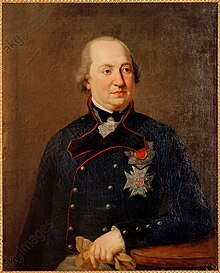Maximilian I Joseph of Bavaria
| Maximilian I Joseph | |
|---|---|
Theatinerkirche , Munich | |
| Spouse |
|
| Signature |  |
Maximilian I Joseph (German: Maximilian I. Joseph; 27 May 1756 – 13 October 1825) was Duke of Zweibrücken from 1795 to 1799, prince-elector of Bavaria (as Maximilian IV Joseph) from 1799 to 1806, then King of Bavaria (as Maximilian I Joseph) from 1806 to 1825. He was a member of the House of Palatinate-Birkenfeld-Zweibrücken, a branch of the House of Wittelsbach.
Early life
Maximilian, the son of the
After the death of his father of testecular cancer in 1767, he was left at first without parental supervision, since his mother had been banished from her husband's court after giving birth to a son fathered by an actor. Maximilian was carefully educated under the supervision of his uncle, Duke
Duke of Zweibrücken and Elector of Bavaria and the Palatinate

On 1 April 1795, Maximilian succeeded his brother Charles II as Duke of Zweibrücken, however his duchy was entirely occupied by revolutionary France at the time.[1]
On 16 February 1799, he became
Maximilian's sympathy with France and the ideas of
In foreign affairs, Maximilian Joseph's attitude was, from the German point of view, less commendable. He never had any sympathy with the growing sentiment of German nationality, and his attitude was dictated by wholly dynastic, or at least Bavarian, considerations. Until 1813, he was the most faithful of
King of Bavaria

The new King of Bavaria was the most important of the princes belonging to the Confederation of the Rhine, and remained Napoleon's ally until the eve of the Battle of Leipzig, when by the Treaty of Ried (8 October 1813) he made the guarantee of the integrity of his kingdom the price of his joining the Allies.[1] On 14 October, Bavaria made a formal declaration of war against Napoleonic France. The treaty was passionately backed by Crown Prince Ludwig and by Marshal von Wrede.[citation needed]
By the first


At Vienna and afterwards Maximilian sturdily opposed any reconstitution of Germany which should endanger the independence of Bavaria, and it was his insistence on the principle of full sovereignty being left to the German reigning princes that largely contributed to the loose and weak organization of the new German Confederation. The Federative Constitution of Germany (8 June 1815) of the Congress of Vienna was proclaimed in Bavaria, not as a law but as an international treaty. It was partly to secure popular support in his resistance to any interference of the Federal diet in the internal affairs of Bavaria, partly to give unity to his somewhat heterogeneous territories, that Maximilian on 26 May 1818 granted a liberal constitution to his people. Montgelas, who had opposed this concession, had fallen in the previous year, and Maximilian had also reversed his ecclesiastical policy, signing on 24 October 1817 a concordat with Rome by which the powers of the clergy, largely curtailed under Montgelas's administration, were restored.[1]
The new parliament proved to be more independent than he had anticipated and in 1819 Maximilian resorted to appealing to the powers against his own creation; but his Bavarian "particularism" and his genuine popular sympathies prevented him from allowing the Carlsbad Decrees to be strictly enforced within his dominions. The suspects arrested by order of the Mainz Commission he was accustomed to examine himself, with the result that in many cases the whole proceedings were quashed, and in not a few the accused dismissed with a present of money.[1]
Maximilian died at Nymphenburg Palace, in Munich,[citation needed] on 13 October 1825 and was succeeded by his son Ludwig I.[1] Maximilian is buried in the crypt of the Theatine Church in Munich.[4]
Cultural legacy

Under the reign of Maximilian Joseph the Bavarian Secularization (1802–1803) led to the nationalisation of cultural assets of the Church. The Protestants were emancipated. In 1808 he founded the
The city of Munich was extended by the first systematic expansion with the new
In 1801 he led the rescue operation when a glassmaker's workshop collapsed, saving the life of Joseph von Fraunhofer, a 14-year-old orphan apprentice. Max Joseph donated books and directed the glassmaker to give Fraunhofer time to study. Fraunhofer went on to become one of the most famous optical scientists and artisans in history, inventing the spectroscope and spectroscopy, making Bavaria noted for fine optics, and joining the nobility before his death at age 39.[citation needed]
He was elected a Royal Fellow of the Royal Society in 1802.[5]
Marriages and issue
As a monarch, Max Joseph was very close to the citizens, walked freely along the streets of Munich without great accompaniment, and conversed with his people in a casual manner. Regardless, he was somewhat eccentric, like some of his descendants and successors. Maximilian married twice and had children by both marriages:[1]
His first wife was Princess Augusta Wilhelmine of Hesse-Darmstadt,[1] daughter of Prince George William of Hesse-Darmstadt (14 April 1765 – 30 March 1796). They were married on 30 September 1785 in Darmstadt. They had five children:
- Ludwig I of Bavaria (25 August 1786 – 29 February 1868), married Therese of Saxe-Hildburghausen.
- Princess Augusta Amalia Ludovika, (21 June 1788 – 13 May 1851), married Eugène de Beauharnais, Duke of Leuchtenberg.
- Princess Amalie Marie Auguste (9 October 1790 – 24 January 1794), died in childhood.
- Princess Caroline Augusta (8 February 1792 – 9 February 1873), married William I of Württemberg, and then Francis II of Austria.
- Prince Karl Theodor Maximilian (7 July 1795 – 16 August 1875), married morganatically to Marie-Anne-Sophie Petin.
Maximilian's second wife was
- Stillborn son (5 September 1799)
- Prince Maximilian Joseph Karl Friedrich (28 October 1800 – 12 February 1803), died in infancy.
- Princess Elisabeth Ludovika ("Elise") (13 November 1801 – 14 December 1873) twin sister of Amalie Auguste. Married Frederick William IV of Prussia.
- John I of Saxony.
- Princess Marie Anne Leopoldine (27 January 1805 – 13 September 1877) twin sister of Sophie. Married Frederick Augustus II of Saxony.
- Princess Sophie Friederike Dorothee (27 January 1805 – 28 May 1872) twin sister of Marie Anna. Married Archduke Franz Karl of Austria, mother of Franz Joseph I of Austria and Maximilian I of Mexico.
- Princess Ludovika Wilhelmine (30 August 1808 – 25 January 1892), married Duke Maximilian Joseph in Bavaria, mother of Empress Elisabeth of Austria.
- Princess Maximiliana Josepha Karoline (21 July 1810 – 4 February 1821), died in childhood.
Ancestry
| Ancestors of Maximilian I Joseph of Bavaria[6] | |||||||||||||||||||||||||||||||||||||||||||||||||||||||||||||||||||||||||||||||||||||||||||||||||||||||||||||||||||||||||||||||||||||||||||||||||||||||||||||||||||||||||||||||||||||||||||||||||||||||||||||||||||||||||||||||||||||||||||||||||||||||||||||||||||||||||||||||||||||||||
|---|---|---|---|---|---|---|---|---|---|---|---|---|---|---|---|---|---|---|---|---|---|---|---|---|---|---|---|---|---|---|---|---|---|---|---|---|---|---|---|---|---|---|---|---|---|---|---|---|---|---|---|---|---|---|---|---|---|---|---|---|---|---|---|---|---|---|---|---|---|---|---|---|---|---|---|---|---|---|---|---|---|---|---|---|---|---|---|---|---|---|---|---|---|---|---|---|---|---|---|---|---|---|---|---|---|---|---|---|---|---|---|---|---|---|---|---|---|---|---|---|---|---|---|---|---|---|---|---|---|---|---|---|---|---|---|---|---|---|---|---|---|---|---|---|---|---|---|---|---|---|---|---|---|---|---|---|---|---|---|---|---|---|---|---|---|---|---|---|---|---|---|---|---|---|---|---|---|---|---|---|---|---|---|---|---|---|---|---|---|---|---|---|---|---|---|---|---|---|---|---|---|---|---|---|---|---|---|---|---|---|---|---|---|---|---|---|---|---|---|---|---|---|---|---|---|---|---|---|---|---|---|---|---|---|---|---|---|---|---|---|---|---|---|---|---|---|---|---|---|---|---|---|---|---|---|---|---|---|---|---|---|---|---|---|---|---|---|---|---|---|---|---|---|---|---|---|---|---|---|---|---|
| |||||||||||||||||||||||||||||||||||||||||||||||||||||||||||||||||||||||||||||||||||||||||||||||||||||||||||||||||||||||||||||||||||||||||||||||||||||||||||||||||||||||||||||||||||||||||||||||||||||||||||||||||||||||||||||||||||||||||||||||||||||||||||||||||||||||||||||||||||||||||
Family tree
| King Maximilian I Joseph's relation to Elector Maximilian I of Bavaria | |||||||||||||||||||||||||||||||||||||||||||||||||||||||||||||||||||||||||||||||||||||||||||||||||||||||||||||||||||||||||||||||||||||||||||||||||||||||||||||||||||||||||||||||||||||||||||||||||||||||||||||||||||||||||||||||||||||||||||||||||||||||||||||||||||||||||||||||||||||||||||||||||||||||||||||||||||||||||||||||||||||||||||||||||||||||||||||||||||||||||||||||||
|---|---|---|---|---|---|---|---|---|---|---|---|---|---|---|---|---|---|---|---|---|---|---|---|---|---|---|---|---|---|---|---|---|---|---|---|---|---|---|---|---|---|---|---|---|---|---|---|---|---|---|---|---|---|---|---|---|---|---|---|---|---|---|---|---|---|---|---|---|---|---|---|---|---|---|---|---|---|---|---|---|---|---|---|---|---|---|---|---|---|---|---|---|---|---|---|---|---|---|---|---|---|---|---|---|---|---|---|---|---|---|---|---|---|---|---|---|---|---|---|---|---|---|---|---|---|---|---|---|---|---|---|---|---|---|---|---|---|---|---|---|---|---|---|---|---|---|---|---|---|---|---|---|---|---|---|---|---|---|---|---|---|---|---|---|---|---|---|---|---|---|---|---|---|---|---|---|---|---|---|---|---|---|---|---|---|---|---|---|---|---|---|---|---|---|---|---|---|---|---|---|---|---|---|---|---|---|---|---|---|---|---|---|---|---|---|---|---|---|---|---|---|---|---|---|---|---|---|---|---|---|---|---|---|---|---|---|---|---|---|---|---|---|---|---|---|---|---|---|---|---|---|---|---|---|---|---|---|---|---|---|---|---|---|---|---|---|---|---|---|---|---|---|---|---|---|---|---|---|---|---|---|---|---|---|---|---|---|---|---|---|---|---|---|---|---|---|---|---|---|---|---|---|---|---|---|---|---|---|---|---|---|---|---|---|---|---|---|---|---|---|---|---|---|---|---|---|---|---|---|---|---|---|---|---|---|---|---|---|---|---|---|---|---|---|---|---|---|---|---|---|---|---|---|---|---|---|---|---|---|---|---|---|---|---|---|---|---|---|---|
| |||||||||||||||||||||||||||||||||||||||||||||||||||||||||||||||||||||||||||||||||||||||||||||||||||||||||||||||||||||||||||||||||||||||||||||||||||||||||||||||||||||||||||||||||||||||||||||||||||||||||||||||||||||||||||||||||||||||||||||||||||||||||||||||||||||||||||||||||||||||||||||||||||||||||||||||||||||||||||||||||||||||||||||||||||||||||||||||||||||||||||||||||
See also
- List of rulers of Bavaria
- History of Bavaria
Notes
- ^ a b c d e f g h i j k l m n o p q Chisholm 1911, p. 291.
- ^ Palmer 1972, pp. 10
- ^ Chisholm 1911, p. 291 cites Baden History, iii, 506.
- ^ "Theatinerkirche München". www.theatinerkirche.de. Archived from the original on 22 August 2021. Retrieved 22 August 2021.
- ^ Royal Society 1802.
- ^ Genealogie ascendante jusqu'au quatrieme degre inclusivement de tous les Rois et Princes de maisons souveraines de l'Europe actuellement vivans [Genealogy up to the fourth degree inclusive of all the Kings and Princes of sovereign houses of Europe currently living] (in French). Bourdeaux: Frederic Guillaume Birnstiel. 1768. p. 94.
References
- ISBN 978-1-85799-868-9.
- "Library Catalog". Royal Society. Retrieved 14 August 2012.
- This article incorporates text from a publication now in the public domain: Chisholm, Hugh, ed. (1911). "Maximilian I., king of Bavaria". Encyclopædia Britannica. Vol. 17 (11th ed.). Cambridge University Press. p. 921.
